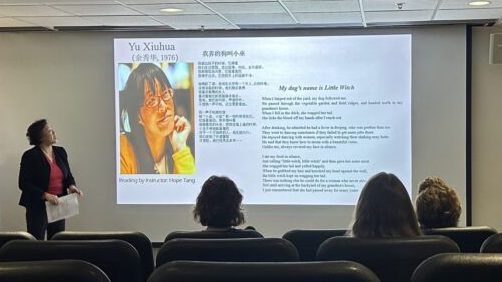Celebrating Women’s History Month through poetry
3 min read
Adjunct Instructor of Chinese Hongbo "Hope" Tang introduces poet Yu Xiuhua. | Charlie Li, The Weekly Ringer
by CHARLIE LI
Staff Writer
On March 29, the department of modern languages and literatures hosted an International Women’s Poetry Recital in Combs Hall in celebration of Women’s History Month.
The recital was organized by Professor of Spanish and Director of the Bachelor of Liberal Studies Ana Chichester and Associate Professor of Spanish Marcelo Fajardo-Cardenas.
“Since 2010, the Multicultural Center has always created a special event during this month for women,” said Fajardo-Cardenas. “The modern languages and literature department has always tried to create specific activities such as the poetry recital to participate in the activities happening in March.”
Brooke Di Lauro, professor of French, elaborated on the department’s participation in Women’s History Month.
“Modern Languages and Literatures sponsored two events in celebration of Women’s History Month,” she said. “The first was our annual international film series for which we chose films highlighting women.”
The event also offered foreign language scholars an opportunity to put their knowledge to practical use, as it was a chance for students to take their pronunciation and recitation out of the classroom and speak in front of an audience. Both students and professors read varying poems in their target language of expertise, which included Spanish, French, German, Arabic, Euskera, Chinese and Arabic.
“The International Poetry Recital also focused on women, but was even more special because, as it was presented bilingually, it offered the rare occasion for all of our majors to come together at one event,” said Di Lauro.
The hour-long event attracted an audience of about 30 students and faculty. In addition to celebrating Women’s History Month, April is also National Poetry Month, which made this event dually important.
“Poetry is like music, it expresses not only what the poet feels but also the people around the poet,” said Fajardo-Cardenas. “The voice used in the poem always goes beyond the poet themselves. For example in Maya Angelou’s poem, ‘Still I Rise,’ she says something that is so universal for the struggles of women, ‘You may write me down in history / With your bitter, twisted lies.’ Not only is she sharing her voice, she is also voicing the struggles of women universally wherever they may be.”
Presenters shared works from female poets such as Mayra Santos-Febres, Leire Bilbao, Nazik Al-Malaika, Gioconda Belli, Eva Strittmatter and Rosario Castellanos. Before every recitation, the reader shared background information about their respective poet, which helped contextualize and understand the subsequent poem.
Adjunct Instructor of Chinese Hongbo “Hope” Tang had one of the longest introductions to the poet she read, Yu Xiuhua. Tang explained that Xiuhua was a disabled Chinese woman who was not able to go to university because she was disabled and a woman. Additionally, she faced extensive hardship from her abusive husband. Her life changed in 2014 when her poem “I Crossed Half of China to Sleep with You” was shared across the platform WeChat throughout China. In doing so, she gained popularity as a poet on the platform, which led to the creation of a documentary about her rise to fame and her divorce from her husband.
All of the poems had English translations shown side-by-side so that attendees could understand the works no matter what foreign language they were studying. Several poems did not have official translations, in which case the professors who read them were responsible for translating them into English. This was no small feat, since it’s quite a chore to maintain the essence of a poem through translation.
While this event was not mandatory for students to attend or read at, the size of the audience highlighted the strength of the department of modern languages both in the faculty and in the student body. Furthermore, it was a great opportunity to see the dedication foreign language students give to their studies pay off both in their pronunciation skills and in their confidence to speak another language fluently.











